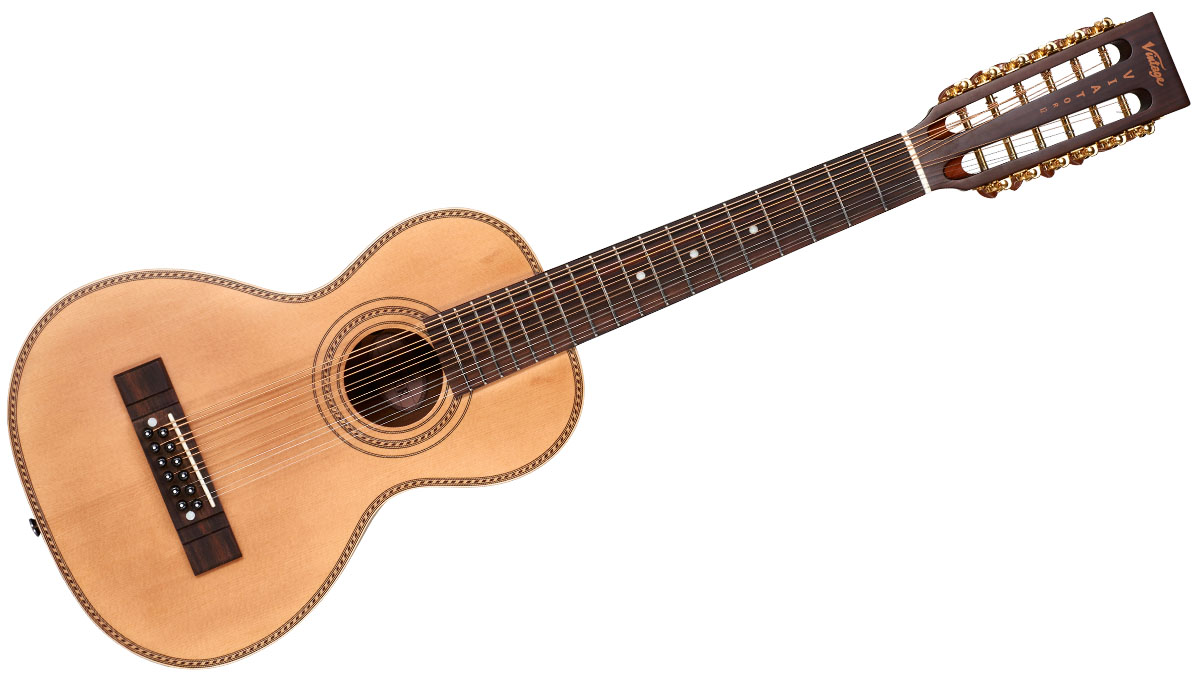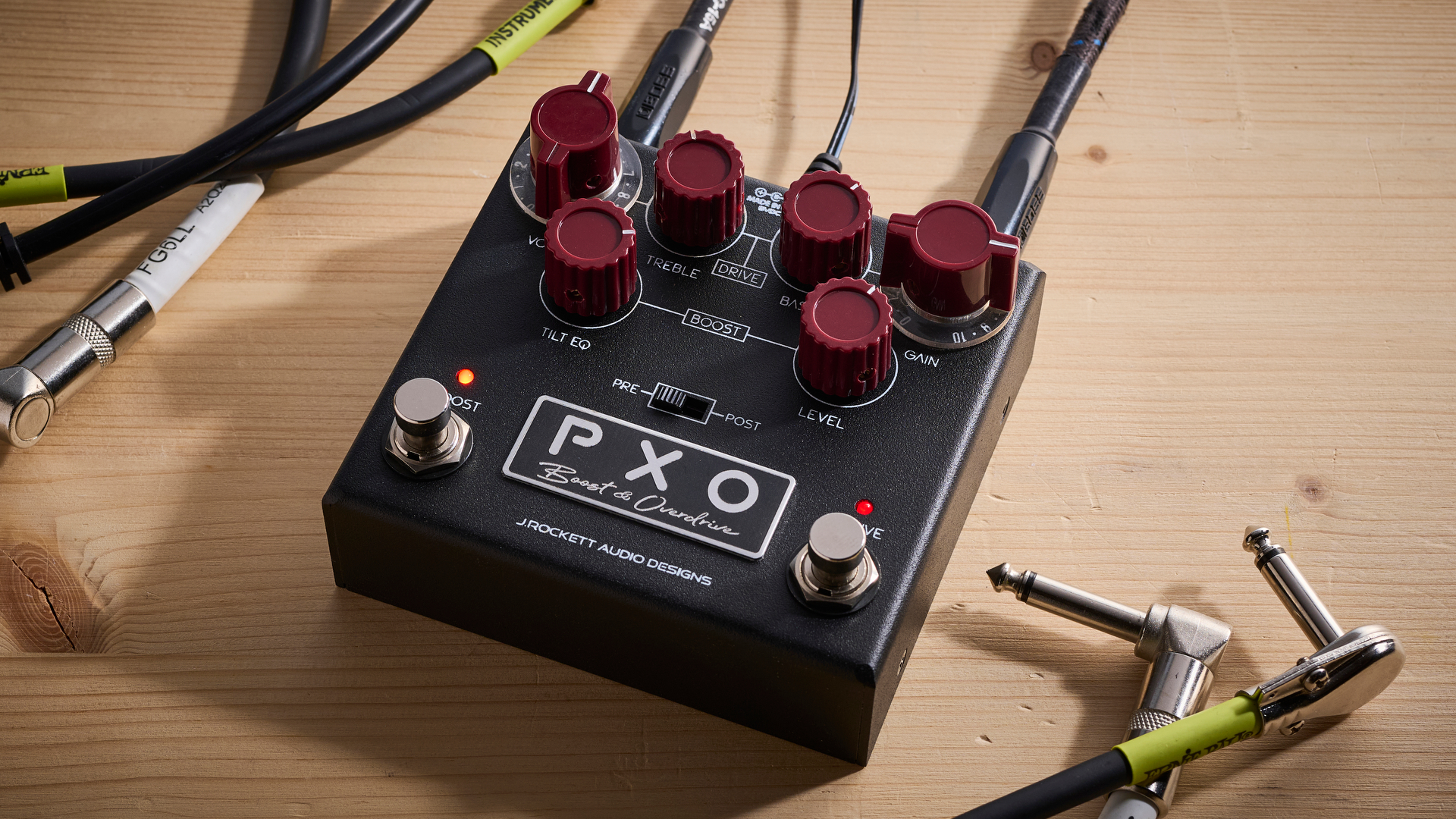MusicRadar Verdict
A near-essential purchase for recording and live work.
Pros
- +
Beautifully-made.
Cons
- -
Very few.
MusicRadar's got your back
We often complain in these pages of the lack of diversity when it comes to modern instrument design, not least in the acoustic world.
Those instruments that do break the mould are, more often than not, far from affordable. Vintage is the house brand of huge UK distributor John Hornby Skewes and aside from offering plenty of highly affordable, run-of-the-mill classic styles, it has an artist programme whose range of instruments is now virtually unparalleled, including the likes of Gordon Giltrap and, as here, Paul Brett. Oh, and they are invariably affordable, too.
Released in autumn 2016, the Viator 12-string guitar is the seventh model in the Vintage by Paul Brett range and the second 12-string to appear. Like the six-string Viator, however, this is a downsized 12-fret 'travel' guitar centred around a condensed 546mm (21.5-inch) scale length. And when we say downsized, we really mean it: the body sits somewhere between a tenor uke and a parlour, just 284mm (11.2 inches) across its lower bouts and 393mm (15.5 inches) in length.
In fact, the elongated slot headstock, at 222mm (8.73 inches) long, nearly matches the body width and initially seems over-large.
As ever with Brett's designs, this Viator makes for a superb overdub instrument...
Construction-wise, an untoned Sitka spruce top sits atop laminated sapele back and sides with a deep red/brown stained colour and, in places, visible wood grain through the all-over satin finish. The top and back are cleanly edge-bound in maple; the top features bold herringbone-style purfling that's echoed around the soundhole giving a very typical Paul Brett 'antique' vibe.
The nato neck has quite a pronounced and characterful 'V' profile and plenty of depth. Fretting on the lightly cambered rosewood 'board is very tidy, and although the bridge looks crowded with its 12 bridge pins, it's very functional with a grown-up 55mm string spread (from the centre points of the outer paired strings), while the nut width is full size with a string spacing of 37.5mm. Incidentally, both the nut and uncompensated saddle are Graph Tech NuBone.
But despite the rather old-world appearance, this 12-string, like others in the range, leaps into the modern day with its onboard Fishman Sonitone preamp system with a USB output for direct recording into your DAW. It's a very discreet system, too, although the soundhole-placed controls are, frankly, hard to reach. The actual soundhole is very small at 69mm in diameter, allowing volume and tone (treble roll-off) adjustment to the output of the Sonicore under-saddle pickup.
Sounds
Its small size does take a little getting used to if played seated, but we do get two strap buttons, so it's easy to strap on and is ideal for any performance outings. Despite the depth and shape, the neck feels rather good, and with a low string height and reduced tension, it's far from tough to play.
That said, it's quite an art to get really clean fretting and it's the same deal for your right hand - fingerpicking takes some practice. But as we get used to this lil' beaut, we begin to coax some surprisingly full and quite projecting sounds from it, sort of like a softer and very folksy mandolin - albeit with six courses. It certainly fills out any sing-along, and aside from that mandolin-like character, it doubles rather nicely as a pseudo Portuguese guitar for those Fado moments, along with producing a double- tracked cavaquinho-like voice, if Brazilian styles are required.
As ever with Brett's designs, this Viator makes for a superb overdub instrument (thanks in part to the clean-sounding USB output), adding lashings of world-music character, not least in altered tunings. In fact, this writer would consider purchasing this mini-12 for those duties alone. Amp'd up it all works perfectly (as long as you don't need to access those soundhole controls too much), while the sound belies its diminutive source through our stage rig.
The 'Viator' is nicely made and sounds good acoustically, amplified or via its USB output, making it perhaps the best Paul Brett model yet. Not only is it perfectly serviceable for standard folk, pop and rock duties, but it proves a dab hand at recreating numerous ethnic styles. Packaged with a mini gigbag, it's a no-brainer as a simple take-anywhere electro 12-string, and for the recording and performing player looking to add texture and character, it's damn near essential.
Dave Burrluck is one of the world’s most experienced guitar journalists, who started writing back in the '80s for International Musician and Recording World, co-founded The Guitar Magazine and has been the Gear Reviews Editor of Guitarist magazine for the past two decades. Along the way, Dave has been the sole author of The PRS Guitar Book and The Player's Guide to Guitar Maintenance as well as contributing to numerous other books on the electric guitar. Dave is an active gigging and recording musician and still finds time to make, repair and mod guitars, not least for Guitarist’s The Mod Squad.
“I used everything I knew about music”: How Green Day exceeded expectations with their most ambitious song
YouTube just added AI tools that makes musicians, library music and video editors redundant
“Every one of them said yes without hesitation": Hank Marvin and Roger Taylor have just remade a '60s classic for charity











